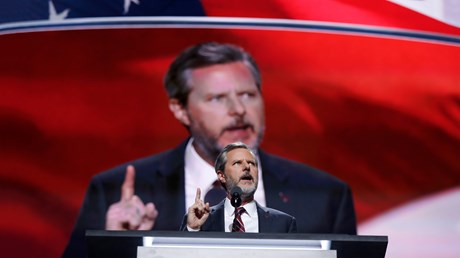But the former Liberty president is a cautionary tale for cultural Christianity.

This piece was adapted from Russell Moore’s newsletter. Subscribe here.
Over the past week, countless friends texted me a Vanity Fair profile of former Liberty University chancellor Jerry Falwell Jr., featuring an extended interview with the man who went from being a kingmaker in the 2016 presidential election to resigning after a series of scandals.
What most people highlighted was not the salacious recounting of the stories but one particular quote from Falwell: “Because of my last name, people think I’m a religious person. But I’m not. My goal was to make them realize I’m not my dad.”
For some, this shows the problem: hypocrisy. If only it were.
When I say that Jerry Falwell Jr. is no hypocrite, I mean it in only one sense. Obviously, Falwell was hypocritical in, among other things, allegedly engaging in behavior that, for even the smallest of the offenses, would have led to fines or expulsions for his students.
In that sense, the scandal is similar to the revelations that British prime minister Boris Johnson attended Downing Street cocktail parties while the public was forbidden by law to gather due to COVID-19 public health measures. And, of course, beyond that is the much more fundamental matter: How can the chancellor of one of the world’s largest Christian universities justify his behavior by saying he’s not religious?
That’s precisely the point, though. Hypocrisy is an ongoing and always-present danger in the church. Jesus warned us to beware of hypocrisy—charging the religious leaders of his day with maintaining piety out of pretense.
For Jesus, the congruence between the inner and the outer—the heart and the mouth, the motivations ...
from Christianity Today Magazine
Umn ministry




.gif)

.gif)
.gif)
